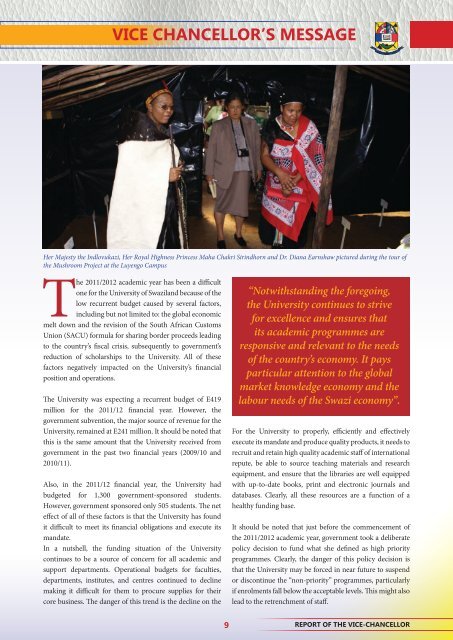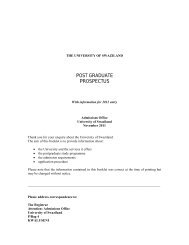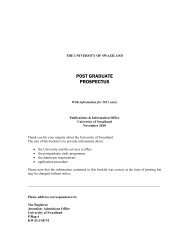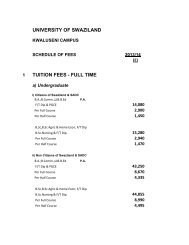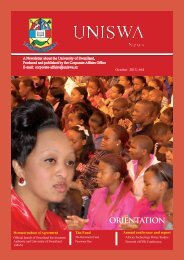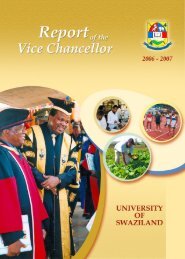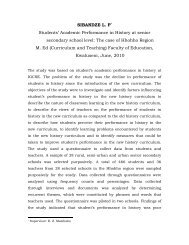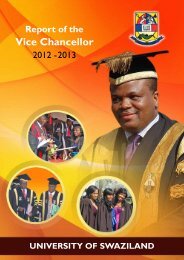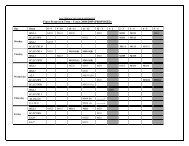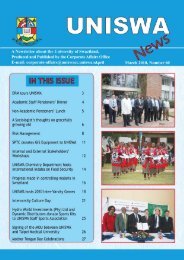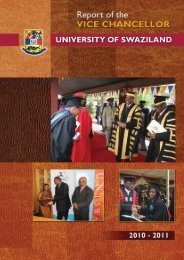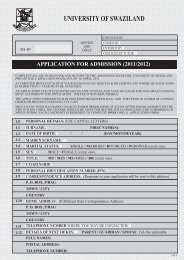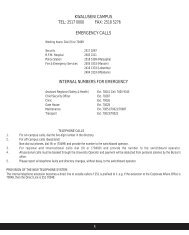CAMPUSES & CENTRES
2011/2012 - University of Swaziland
2011/2012 - University of Swaziland
You also want an ePaper? Increase the reach of your titles
YUMPU automatically turns print PDFs into web optimized ePapers that Google loves.
VICE CHANCELLOR’S MESSAGEHer Majesty the Indlovukazi, Her Royal Highness Princess Maha Chakri Sirindhorn and Dr. Diana Earnshaw pictured during the tour ofthe Mushroom Project at the Luyengo CampusThe 2011/2012 academic year has been a difficultone for the University of Swaziland because of thelow recurrent budget caused by several factors,including but not limited to: the global economicmelt down and the revision of the South African CustomsUnion (SACU) formula for sharing border proceeds leadingto the country’s fiscal crisis, subsequently to government’sreduction of scholarships to the University. All of thesefactors negatively impacted on the University’s financialposition and operations.The University was expecting a recurrent budget of E419million for the 2011/12 financial year. However, thegovernment subvention, the major source of revenue for theUniversity, remained at E241 million. It should be noted thatthis is the same amount that the University received fromgovernment in the past two financial years (2009/10 and2010/11).Also, in the 2011/12 financial year, the University hadbudgeted for 1,300 government-sponsored students.However, government sponsored only 505 students. The neteffect of all of these factors is that the University has foundit difficult to meet its financial obligations and execute itsmandate.In a nutshell, the funding situation of the Universitycontinues to be a source of concern for all academic andsupport departments. Operational budgets for faculties,departments, institutes, and centres continued to declinemaking it difficult for them to procure supplies for theircore business. The danger of this trend is the decline on thequality of the University’s products.“Notwithstanding the foregoing,the University continues to strivefor excellence and ensures thatits academic programmes areresponsive and relevant to the needsof the country’s economy. It paysparticular attention to the globalmarket knowledge economy and thelabour needs of the Swazi economy”.For the University to properly, efficiently and effectivelyexecute its mandate and produce quality products, it needs torecruit and retain high quality academic staff of internationalrepute, be able to source teaching materials and researchequipment, and ensure that the libraries are well equippedwith up-to-date books, print and electronic journals anddatabases. Clearly, all these resources are a function of ahealthy funding base.It should be noted that just before the commencement ofthe 2011/2012 academic year, government took a deliberatepolicy decision to fund what she defined as high priorityprogrammes. Clearly, the danger of this policy decision isthat the University may be forced in near future to suspendor discontinue the “non-priority” programmes, particularlyif enrolments fall below the acceptable levels. This might alsolead to the retrenchment of staff.9REPORT OF THE VICE-CHANCELLOR


